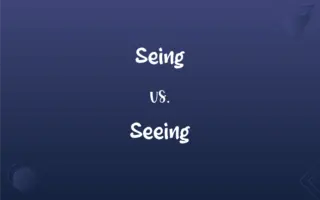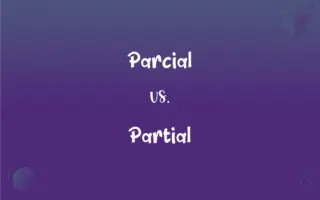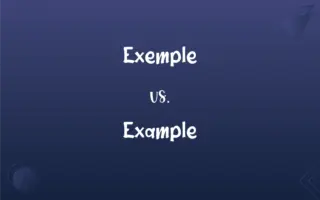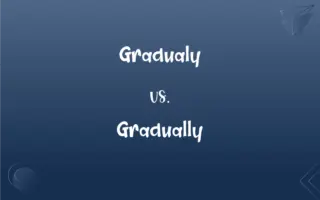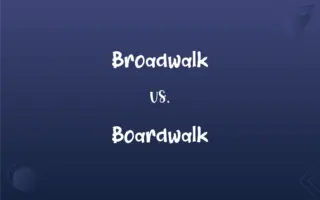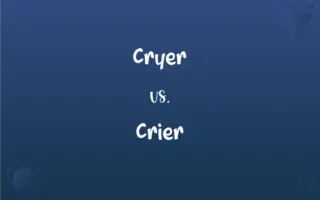Showned vs. Shown: Mastering the Correct Spelling
Edited by Aimie Carlson || By Janet White || Updated on March 12, 2024
"Showed" is the simple past tense of "show", and "shown" is its past participle. "Showed" is often mistakenly spelled as "showned", which is incorrect.
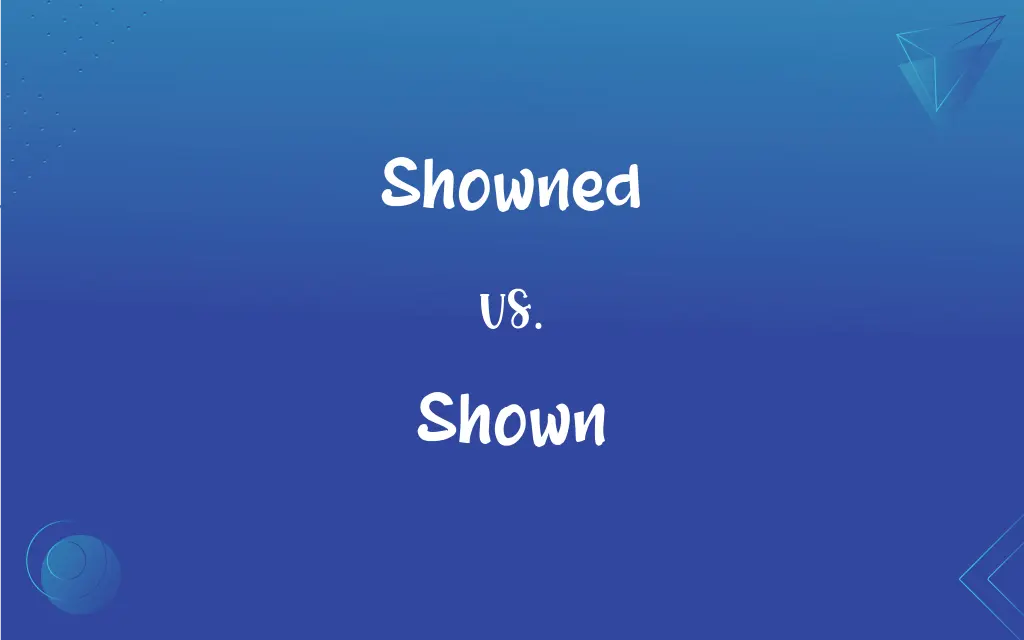
Which is correct: Showned or Shown
How to spell Shown?

Showned is Incorrect

Shown is Correct
ADVERTISEMENT
Key Differences
Recall that "owned" is a word but "showned" is not.
Memorize the phrase: "The movie was shown, not showed."
Remember that "showed" ends in "ed" and "shown" does not.
Notice that other words with similar endings like "known" don't have an "ed" version.
Link the word "show" with a light (like a flashlight) to visualize "shone", which sounds like "shown".
ADVERTISEMENT
Correct usage of Shown
The results were showned on the screen.
The results were shown on the screen.
He hadn't showned any interest in the project.
He hadn't shown any interest in the project.
The path was showned to us by a guide.
The path was shown to us by a guide.
The difference was clearly showned in the comparison.
The difference was clearly shown in the comparison.
She showned me her new drawing.
She shown me her new drawing.
Shown Definitions
"Shown" can describe the presentation of evidence or proof.
The evidence was shown to the jury.
"Shown" describes having broadcasted something on television.
The episode was shown last night.
"Shown" is the past participle of "show", indicating something has been displayed.
The paintings were shown in the gallery.
"Shown" can also indicate a demonstration.
The new features were shown during the product launch.
"Shown" refers to revealing or making known.
The true colors of a person are often shown in tough times.
A past participle of show.
Past participle of show
I had shown him the report already.
The report had already been shown to him.
Shown Sentences
The movie will be shown on TV next week.
I've never been shown such kindness before.
His true feelings were shown in the letter.
My parents have always shown me support.
The artist has shown her latest work in the gallery.
The teacher shown us how to solve the problem.
Her face shown happiness when she heard the news.
She had always shown a talent for music.
The diagram shown how the machine works.
The stars can be clearly shown on a dark night.
The study has shown the benefits of exercise.
His generosity was shown when he donated to the charity.
The map shown the quickest way to get there.
The documentary shown how lions hunt in the wild.
She shown an interest in learning Spanish.
The chef shown us how to make the perfect pasta.
The painting shown the beauty of the countryside.
He shown a great deal of bravery.
The experiments have shown the theory to be true.
The guide shown us through the ancient ruins.
The children were shown how to plant seeds.
The forecast has shown a chance of rain.
The facts were clearly shown in the report.
New evidence was shown to the jury.
His hard work was shown in his grades.
FAQs
What is the root word of Shown?
The root word is "show".
Which vowel is used before Shown?
Depending on the context, "a" or "the" can be used before "shown".
What is the pronunciation of Shown?
Shown is pronounced as /ʃoʊn/.
Why is it called Shown?
It is called "shown" because it is the past participle form of the verb "show".
What is the plural form of Shown?
"Shown" doesn't have a plural form, as it's the past participle of the verb "show".
What is the verb form of Shown?
The base verb form is "show".
What is the singular form of Shown?
"Shown" is not a noun, so it doesn't have a singular or plural form.
Which article is used with Shown?
Both "a" and "the" can be used depending on the context.
Which conjunction is used with Shown?
Any conjunction can be used, depending on the sentence structure.
Is Shown an abstract noun?
No, "shown" is not an abstract noun.
Is Shown a noun or adjective?
"Shown" is neither. It's a verb form (past participle).
Is Shown an adverb?
No, "shown" is not an adverb.
Which preposition is used with Shown?
"To" and "on" are commonly used (e.g., shown to, shown on).
Is the Shown term a metaphor?
No, "shown" itself is not a metaphor.
Is the word Shown imperative?
No, "shown" is not in the imperative form.
How do we divide Shown into syllables?
"Shown" is not divided, as it is one syllable.
What part of speech is Shown?
"Shown" is a verb (past participle form).
What is another term for Shown?
Another term for "shown" is "displayed" or "revealed".
What is the second form of Shown?
The second form is "showed".
What is the third form of Shown?
The third form is "shown".
Is Shown a vowel or consonant?
"Shown" is a word containing both vowels and consonants.
Is Shown a collective noun?
No, "shown" is not a collective noun.
How many syllables are in Shown?
"Shown" has one syllable.
What is a stressed syllable in Shown?
The entire word "shown" is stressed as it's just one syllable.
What is the opposite of Shown?
The opposite of "shown" could be "hidden".
Which determiner is used with Shown?
Determiners like "the", "this", or "that" can be used depending on the context.
What is the first form of Shown?
The first form is "show".
Is Shown a negative or positive word?
"Shown" is neutral; its connotation depends on context.
Is Shown a countable noun?
"Shown" is not a noun, so it's neither countable nor uncountable.
How is Shown used in a sentence?
In a sentence, "shown" can be used like this: "The movie has already been shown in theaters."
About Author
Written by
Janet WhiteJanet White has been an esteemed writer and blogger for Difference Wiki. Holding a Master's degree in Science and Medical Journalism from the prestigious Boston University, she has consistently demonstrated her expertise and passion for her field. When she's not immersed in her work, Janet relishes her time exercising, delving into a good book, and cherishing moments with friends and family.
Edited by
Aimie CarlsonAimie Carlson, holding a master's degree in English literature, is a fervent English language enthusiast. She lends her writing talents to Difference Wiki, a prominent website that specializes in comparisons, offering readers insightful analyses that both captivate and inform.
